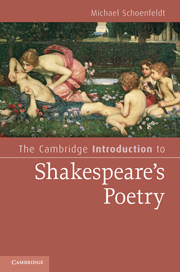Book contents
- Frontmatter
- Contents
- Acknowledgments
- Chapter 1 Shakespeare and English poetry
- Chapter 2 Shakespeare's banquet of sense
- Chapter 3 Constraint and complaint in Lucrece
- Chapter 4 Mysteries of the Sonnets
- Chapter 5 Time and mortality in the Sonnets
- Chapter 6 Friendship and love, darkness and lust
- Chapter 7 Solitary and mutual flames
- Chapter 8 Fantasies of Shakespearean authorship
- Notes
- Further reading
- Index
- Cambridge Introductions to Literature
Chapter 4 - Mysteries of the Sonnets
Dedication, publication, sequence, characters
Published online by Cambridge University Press: 05 June 2012
- Frontmatter
- Contents
- Acknowledgments
- Chapter 1 Shakespeare and English poetry
- Chapter 2 Shakespeare's banquet of sense
- Chapter 3 Constraint and complaint in Lucrece
- Chapter 4 Mysteries of the Sonnets
- Chapter 5 Time and mortality in the Sonnets
- Chapter 6 Friendship and love, darkness and lust
- Chapter 7 Solitary and mutual flames
- Chapter 8 Fantasies of Shakespearean authorship
- Notes
- Further reading
- Index
- Cambridge Introductions to Literature
Summary
There has been more nonsense written about Shakespeare's Sonnets than about any other piece of literature extant.
– W. H. AudenThere are few texts for which it would not be overkill to devote an entire chapter to what we do not know. But the Sonnets have been so obscured by clouds of speculation that it seems important to clear the air by saying what we know and don't know about them before we start reading them. Interpretation of the Sonnets is frequently interwoven with a series of seductive possibilities and undemonstrable hypotheses. When so little is certain, it is best to confess the limits of our knowledge, and begin to work from there.
Publication and dedication
The Sonnets were first published in 1609, in a volume entitled Shake-Speares Sonnets. Never before Imprinted. But even this claim is at best a half-truth. In 1599, versions of two sonnets (ones that become Sonnets 138 and 144) were published in a volume entitled The Passionate Pilgrim, a small collection of twenty poems purporting to be by Shakespeare. Only five of the poems are known to be by Shakespeare – the two sonnets, and versions of three sonnets from Shakespeare's play Love's Labour's Lost. The volume was apparently designed to exploit Shakespeare's growing reputation as a dramatist and as a non-dramatic poet; the title may be a reference to a line in the popular Romeo and Juliet, where lips are imagined as “two blushing pilgrims.”
- Type
- Chapter
- Information
- The Cambridge Introduction to Shakespeare's Poetry , pp. 57 - 68Publisher: Cambridge University PressPrint publication year: 2010

